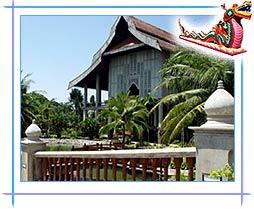History
Terengganu's strategic location in the South China Sea made it an important trade center since ancient times. Earlier records indicate that it had trading relations with China. Like other Malay states, Terengganu practiced a Hindu-Buddhist culture combined with animist traditional beliefs for hundreds of years before the arrival of Islam. Under the influence of Srivijaya, Terengganu also traded extensively with the Majapahit Empire, and the Khmer. According to a stone monument dated 1303 with Arabic inscriptions found in Kuala Berang, Terengganu was perhaps the first Malay state to receive Islam. Terengganu became a vassal state of Melaka, but retained considerable autonomy with the emergence of Riau-Johor.
Terengganu emerged as an independent sultanate in 1724. The first Sultan was Tun Zainal Abidin, the younger brother of a former sultan of Johor, and Johor strongly influenced Terengganu politics through the 18th century. In
 the 19th century, Terengganu became a vassal state of
Siam. Under Siamese rule, Terengganu prospered, and was given
considerable autonomy. The terms of the Anglo-Siamese Treaty of 1909
Siam ceded to Great Britain. A British Resident was installed after
considerable reluctance in 1919, and Terengganu became one of the
Unfederated Malay States. During World War II, Japan transferred
Terengganu back to Siam, along with Kelantan, Kedah, and Perlis, but
after the defeat of Japan, these Malay states returned to British
control. Terengganu became a member of the Federation of Malaya in 1948,
and a state of independent Malaya in 1957.
the 19th century, Terengganu became a vassal state of
Siam. Under Siamese rule, Terengganu prospered, and was given
considerable autonomy. The terms of the Anglo-Siamese Treaty of 1909
Siam ceded to Great Britain. A British Resident was installed after
considerable reluctance in 1919, and Terengganu became one of the
Unfederated Malay States. During World War II, Japan transferred
Terengganu back to Siam, along with Kelantan, Kedah, and Perlis, but
after the defeat of Japan, these Malay states returned to British
control. Terengganu became a member of the Federation of Malaya in 1948,
and a state of independent Malaya in 1957. Climate
Terengganu has tropical monsoon climate. The temperature is relatively uniform within the range of 21°C to 32°C throughout the year. During the months of January to April, the weather is generally dry and warm. Humidity is consistently high (approximately 80%). The average rainfall per year is from 2,000 mm to 2500 mm and the period from November to January is the main rainy season.
Best Time to Visit
It is better to avoid going to Terengganu during the period from November to January as it the main rainy season.
Tourist Attractions/Places to See
Kuala Terengganu: Kuala Terengganu is the capital of Terengganu. Though it is fast changing into a modern city, yet the charm of the old world is neither lost nor forgotten. You can start your visit to Terengganu from Kuala Terengganu.
Terengganu State Mosque: The mosque was built on the estuary of Terengganu river and its intricate design gives viewers the impression that the mosque is actually floating on water. This place of worship is beautifully lit at night and presents a spectacular sight.
Terengganu State Museum: Located on a hill in Jalan Cherong Lanjut, the Terengganu State Museum contains a fine collection of nineteenth-century Chinese wares, showing a clear Islamic influence, prehistoric tools from the Stone Age, and ancient manuscripts of Islamic calligraphy.
Marang: Marang is a picturesque fishing village with tall swaying coconut trees, cool fresh air, a beautiful lagoon, and a fleet of fish trawlers. Marang can easily captivate you with its natural beauty and simple ambience.
Suterasemai Centre: Located 6 km from Kuala Terengganu, Suterasemai Centre is Malaysia's pioneer silk weaving center where visitors can witness different stages of silk manufacturing.
Kenyir Lake: Located in the interior part of Terengganu, Kenyir Lake is the largest man-made lake in Southeast Asia. The lake is the catchment area of Malaysia's largest rock-filled hydroelectric dam. The area around the lake is ideal for jungle trekking and nature walks.
Sekayu Waterfalls, Kuala Berang: A favorite retreat for visitors and locals alike, it has seven cascades surrounded by its natural landscape of lush jungle-clad hills, a fruit orchard, a mini zoo, a bird park, a flower garden, and numerous species of flora and fauna.
Rantau Abang: Located 60km south of Kuala Terengganu, the beach at Rantau Abang is the venue for the annual migration of huge leatherback turtles. Visitors lay in wait quietly from midnight to dawn to watch giant leatherback turtles laying eggs.
Redang Island: Located 50km from Terengganu, Redang Island is a scuba diver's paradise. The island is famous for its pristine beaches and spectacular marine life.
Perhentian Islands: Situated 21km off the coast of Terengganu, Perhentian Islands are topical paradise. They consist of two islands Pulau Perhentian Besar and Pulau Perhentian Kecil.
Bukit Keluang: Bukit Keluang is located 140 km north of Kuala Terengganu. The place has a wonderful beach and is an ideal site for swimming, snorkeling and wind surfing.
Shopping
Terengganu is an ideal place for buying handicrafts and other local products such as silk, batik work and weaving items. There are many craft centers throughout the state from where you can buy these items.
How to Reach Terengganu
There are regular flights from Kuala Lumpur and Johor Bahru to Terengganu. The road journey takes three hours from Kuala Lumpur. Buses to Terengganu are available from all the major cities of Malaysia.



